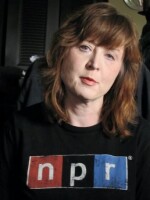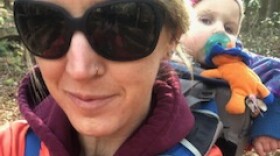In the past couple of weeks, we’ve brought you thoughts on the pandemic year from residents of central and northern Pennsylvania. To end the series today, WPSU’s Kristine Allen spoke with Melissa Dibble, a travel nurse from McKean county, who worked in the heart of the crisis, at a New Jersey hospital.
ALLEN: Why did you decide to go from the relative safety of McKean county into practically the epicenter of the COVID crisis in New Jersey?
DIBBLE: I wasn’t planning on it. When COVID really hit, the hospital I was at was in Erie and they released all of their travel nurses.
Melissa Dibble lives in Marshburg, Pennsylvania, in rural McKean county. She works as a travel nurse, usually at hospitals up to 5 hours away from her home. When the Erie job ended, she thought she might just stay home with her kids who were doing virtual school.
DIBBLE: And my recruiter called me and she’s like ‘New Jersey is putting up an SOS right now.’ I said OK, but I really didn’t understand how bad COVID was. I was very naïve going into it.
The New Jersey hospital that hired Dibble was filled entirely with COVID-19 patients.
DIBBLE: You know when I went to New Jersey, I didn’t grasp the seriousness of the situation. I did my orientation, and they said ‘Go up to the floor.’ I got up to the floor, and it was N95, hair up in a bun, and a paper mask. The shield. The - you know I called it the blue garbage bag that you never took off. Double gloves. And then that was the moment where I said ‘I have to call my husband and tell him I cannot come home.’ Because every single room in this hospital had two beds in it. And they were all full.”
Dibble couldn’t risk going home, even for the weekend, for fear of spreading the disease to her family. So she stayed at a hotel.
DIBBLE: It was about 8 weeks before I saw my family again.

And those weeks were intense.
DIBBLE: Well my shifts were 12-hour nights. You know, we got there, we garbed up. You didn’t even walk into the hospital without your N95 on. They never came off. My first night there by myself – actually they had run out of space at the hospital, so they opened up a closed wing. The rooms didn’t even have TVs. They didn’t have call bells. The people had like Life Alert buttons that would ding. I mean these rooms were just – they were set to be torn down. And I got in with the other nurse and I said ‘Oh, how many patients do we have?’ And he says, ‘Oh, sixteen.’ And I said ‘Are we getting an aide?’ He said, ‘Nope.’ I said, ‘Where’s the other nurse?’ He said, ‘I’m the other nurse.’
ALLEN: You said COVID can be very unpredictable. Are there times when you experienced sudden changes in patients, for the better or for the worse?
DIBBLE: I came onto a shift. And this is probably week 2 or week 3, so I had lost a lot of patients already. We were pretty much doing battlefield triage. If you were too sick or too old they contacted your family and said can we just make this patient CMO: comfort measures only. And we hung morphine to make them more comfortable. But I was assigned a 35-year-old male. He was on three liters of oxygen. And I assessed him, gave him some medication. He really didn’t speak very good English. He was Hispanic. But he understood me when I asked him if we was okay and everything. His lungs didn’t sound too good. But he was maintaining his oxygen saturation on three liters. And when I left the room, he was starting to FaceTime with his family.
And I don’t know what brought me back into that room. But roughly 20 minutes later I walked in and he wasn’t looking so good. He was kind of a greyish color. And I checked his oxygen saturation, and it was plummeting. So I’m increasing his oxygen. It’s not working. I put a face mask on him to give him a higher flow. It’s not working. And he went unconscious. So we called the code on him. My aide was super. She was doing compressions. I opened a line of fluids. Attached the defibrillator pads to him, was pushing medications. And the whole code squad walked in. They had him intubated. And we worked on this gentleman for about 45 minutes. And the doctor called his time of death. And we all just went quiet. Then we heard the screaming. And we realized that during the entire thing his family had still been on FaceTime.
ALLEN: Oh, that poor family. You went through weeks of things like this.
DIBBLE: Yeah.
ALLEN: How has this experience changed you?
DIBBLE: I still am very compassionate toward my patients. I believe in humanity. You treat people the way you want to be treated. But my husband really wasn’t kidding when he said it was like my Iraq.
ALLEN: Like a war zone.
DIBBLE: Too many people died. And it wasn’t because we weren’t trying to save them. Even the ones that they were making comfort measures only - we didn’t want those people to die. That goes against everything any nurse has ever been trained for. That was really the hard part. And then, you know, hearing people talk about their rights and their freedoms. If they don’t want to wear a mask, they don’t have to. And it was kind of like a big slap in the face.
After New Jersey, Dibble took a job at a hospital in Pennsylvania where there were no N95 masks and no gowns. Only a paper mask. It was there that Dibble contracted COVID herself, and unknowingly passed it to her family. Her family has completely recovered. But Dibble says she now has to take heart medication for the rest of her life. And she’s only 36.
ALLEN: What is your outlook on life now?
DIBBLE: Life is way too short.
ALLEN: Yeah.
DIBBLE: Way too short. And my hope for those people who decide not to get vaccinated if it’s available to them. I hope it opens their eyes, and they see the reality here. We need the heard immunity.
ALLEN: If at some point this pandemic gets under control, what’s the first thing you’re looking forward to doing?
DIBBLE: You know, I’d really like to take my grandmother on a vacation.
ALLEN: Where to?
DIBBLE: Wherever she would love to go.
ALLEN: Yeah? What does she like?
DIBBLE: Palm trees. (Laughter)
Thanks to Kimberly Weinberg of Pitt Bradford for help with this story. You’ll find all of our personal pandemic stories with WPSU’s COVID-19 coverage on our website, at wpsu.org/covid19










